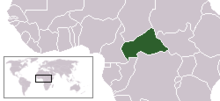The Central African Republic Portal
The Central African Republic (CAR), formerly known as Ubangi-Shari, is a landlocked country in Central Africa. It is bordered by Chad to the north, Sudan to the northeast, South Sudan to the east, the Democratic Republic of the Congo to the south, the Republic of the Congo to the southwest, and Cameroon to the west. Bangui is the country's capital and largest city, bordering the Democratic Republic of the Congo. The Central African Republic covers a land area of about 620,000 square kilometres (240,000 sq mi). As of 2024, it has a population of 5,357,744, and is in the scene of a civil war, which has been ongoing since 2012. As a former French colony, French is the official language, with Sango, a Ngbandi based-creole language as the national and co-official language. The Central African Republic mainly consists of Sudano-Guinean savannas, but the country also includes a Sahelo-Sudanian zone in the north and an equatorial forest zone in the south. Two-thirds of the country is within the Ubangi River basin (which flows into the Congo), while the remaining third lies in the basin of the Chari, which flows into Lake Chad. What is today the Central African Republic has been inhabited since at least 8,000 BCE. The country's borders were established by France, which ruled the country as a colony starting in the late 19th century. After gaining independence from France in 1960, the Central African Republic was ruled by a series of autocratic leaders, including an abortive attempt at a monarchy under the regime of Jean-Bedel Bokassa. By the 1990s, calls for democracy led to the first multi-party democratic elections in 1993. Ange-Félix Patassé became president, but was later removed by General François Bozizé in a 2003 coup. The Central African Republic Bush War began in 2004 and, despite a peace treaty in 2007 and another in 2011, civil war resumed in 2012. The civil war perpetuated the country's poor human rights record: it was characterized by widespread and increasing abuses by various participating armed groups, such as arbitrary imprisonment, torture, and restrictions on freedom of the press and freedom of movement. (Full article...) Selected article -Lesbian, gay, bisexual, transgender, and queer (LGBTQ) people in the Central African Republic face legal and social challenges not experienced by non-LGBTQ residents. Both male and female types of same-sex sexual activity are legal in the Central African Republic, but LGBTQ persons still face discrimination among the broader population. The Central African Republic was one of the few African states that signed a "joint statement on ending acts of violence and related human rights violations based on sexual orientation and gender identity" at the United Nations, condemning violence and discrimination against LGBTQ people. (Full article...) General images -The following are images from various Central African Republic-related articles on Wikipedia.
MapDid you know (auto-generated)
Entries here consist of Featured articles and Good articles, which consist of high-quality content on English Wikipedia..
Lieutenant Colonel Alexandre Banza (10 October 1932 – 12 April 1969) was a military officer and politician in the Central African Republic. Born in Carnot, Ubangi-Shari, Banza served with the French Army during the First Indochina War before joining the Central African Armed Forces. As commander of the Camp Kassaï military base in 1965, Banza helped Jean-Bédel Bokassa overthrow the government of President David Dacko. Bokassa rewarded Banza by appointing him as minister of state and minister of finance in the new government. Banza quickly established the new regime's reputation abroad and forged diplomatic relations with other countries. In 1967, Bokassa and his protégé had a major argument over the president's extravagances. In April 1968, Bokassa removed Banza as minister of finance. Recognizing Bokassa's attempts to undermine him, Banza made a number of remarks highly critical of the president's handling of the government. Bokassa responded by abolishing the minister of state position. Banza soon decided to stage a coup d'état. He confided in a few military officers, who he hoped would support his attempt to gain power. One of his confidants, Jean-Claude Mandaba, contacted the president and informed him of the date of the coup, 9 April 1969. Hours before he was going to execute his bid for power, Banza was ambushed by Mandaba and taken directly to Bokassa. Bokassa nearly beat Banza to death before Mandaba suggested that Banza be put on trial for appearance's sake. On 12 April, Banza presented his case to a military tribunal, which quickly sentenced him to death by firing squad. He was reportedly taken to an open field, where he was executed and buried in an unmarked grave. Alternate circumstances of Banza's death have been reported in Time and Le Monde. In the aftermath of the failed coup, Banza's family, mistress and close associates were all arrested and either sent to jail or deported. With Banza eliminated, Bokassa spent extravagantly and surrounded himself with adulators. (Full article...) CategoriesWikiProjectsRelated portalsCities
* not the capital of the prefecture
TopicsAssociated WikimediaThe following Wikimedia Foundation sister projects provide more on this subject:
Discover Wikipedia using portals | ||||||||||||||||||||||||||||||||||||||||||||||||||||||||||||||||




























































